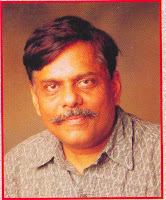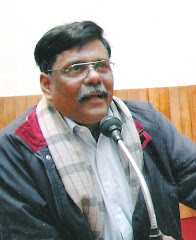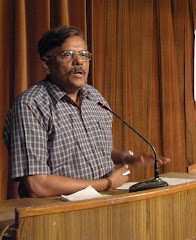Saturday, December 25, 2010
Speech delivered by Sri Vibhuti Narain Rai, Vice Chancellor in the conclave of Vice Chancellors of Indian and Chinese Universities on 4th of November 2010 in Beijing during Beijing Forum -2010
Excellencies, ladies and gentlemen,
It gives me immense pleasure and I consider it a great honour to be in the midst of such a distinguished gathering. This conference on the theme of cooperation between India and China in the field of higher education has special meaning to me. I personally feel that India and China are two great ancient civilizations of East and both had inbuilt faith in quality education based on human values. Both have built and successfully run centers of excellence in higher education before Europe and America could have dreamt of it. I am thankful to the University of Peking for inviting me and making my maiden trip to this beautiful city of Beijing possible.
My university i.e. Mahatma Gandhi Antarrashtriya Hindi Vishwavidyalaya, Wardha or Mahatma Gandhi International Hindi University, Wardha is a non conventional university solely dedicated to the cause of Hindi language and literature. It is located at Wardha in the state of Maharashtra which was the experiment ground of Mahatma Gandhi, the father of Indian nation, who tested programs like non- violence and elementary education, which were very dear to his heart , here during last 12 years of his life which he spent in Sevagram, Wardha .Great Chinese thinker Prof. Tan Yunshan, who established Cheena- Bhavan(Department of Chinese) at Shanti Niketan , Vishwa Bharti University in along with Gurudev Robindra Nath Tagore in 1937 had visited Wardha several times to meet and discuss issues of world importance with Mahatma Gandhi .Several other great personalities from China like Madam Chang Kashek and Hengchih Tao also visited Wardha to meet Mahatma Gandhi.
Our University is an effort to fulfill another favourite program of Mahatma Gandhi. He always dreamt of making Hindi a world language and the endeavour to achieve this goal by Indian leadership was an important factor behind the creation of this institution. It was established with a mandate to provide Hindi; tools necessary to enable it become a world language in the global and functional sense of the term. During less than one and half decades of its existence it has become a referral center for all Hindi teaching and research institutions within India and now it is trying to coordinate Hindi activities outside. The faculty of the University is rendering its services to Indian and foreign universities in the field of syllabus development, content creation and making of audio-visual aids.
We have tried to establish special relationship with the Chinese people and their language. Not only that we run very popular programs of teaching Chinese language at various levels , we periodically organize shows of Chinese films and symposia on various aspects of Chinese literature and life depicted in it. Chinese students are also visiting us to learn Hindi. If I am permitted to recollect only from recent past I would like to mention that four Chinese students participated in one year advanced diploma program in Hindi language in the year 2006-07.In the academic session 2009 two more Chinese students joined the University . I am proud to find many of our ex-students present in this meeting. Our School of Language, which runs courses for Spanish, French and Japanese languages in addition to Chinese, has found that Chinese is the most popular foreign language among the students. Recently School of Language has organised Photographic Exhibition on China which also included screening of Chinese Films.
Friends, we should look forward for future tie ups and Hindi certainly will be one such area which needs to be given special attention as it has lot of potentials and has not been exploited fully so far .It will not be out of place to mention that India is one of the fastest growing economies of the world and the trade between China and India has increased many fold during the last few years. Many Chinese multi nationals have opened their offices in India and large number of Chinese officials and workers are operating from Indian soil. Similarly Indian businessmen are also trying to take advantage of the new possibilities which have come to their way after opening of the avenues in the recent past. Besides business, tourism is another area where lot of happening is being witnessed. One can see large number of Indians and Chinese crossing borders and visiting each other. In both these areas knowing Hindi could be a great help to the Chinese citizens.
You all know that India consists of more than half a million villages. Last few decades witnessed these villages changing fast. From an almost static and very slow change situation these villages have become tools of rapid growth of Indian economy. Better connectivity, increased health facilities and quality education has integrated them to the market and as a group they may be termed as one of the biggest consumer block in the world. Indian cities, small and big, have witnessed unprecedented economic activities recently but now they are saturated forcing business to find new areas for expansion. The rural India is the only answer for them. This gives Hindi a unique historical opportunity. It is a known fact that Hindi through its various forms and dialects is spoken in large part of the country and even where it is not so it is understood by the majority. Anybody who wants to reach vast land spread in the rural India will have to use Hindi in one way or the other.
I personally feel that Chinese people who are considered to be the great entrepreneurs will not fail to understand the importance of learning Hindi. In fact they have always shown deep interest in Indian languages like Sanskrit, Pali and Hindi. Peking University is teaching these languages for many decades. I understand that seven universities in China are running Hindi programs at various levels. To strengthen these efforts my University is always willing to render services and enter into such understanding which may be considered mutually beneficial. Our physical infrastructure and faculty may be of immense help to the Chinese students who are interested in pursuing their knowledge of Hindi to a higher level. May I take this opportunity to offer the services of my university to the students of China in this field. I sincerely feel that it will not only help us achieve the goal of our institution but will cement further the historical ties of friendship between two great civilizations. With newly built hostel for International students and state of the art infrastructure, I am sure we will not be a disappointment for Chinese students. Wardha, in any case is the best place to learn Hindi as there are very few distractions compared to bigger cities of India.
I again offer my sincere thanks to the University of Peking for inviting me here and look forward for more co-operations in future.
It gives me immense pleasure and I consider it a great honour to be in the midst of such a distinguished gathering. This conference on the theme of cooperation between India and China in the field of higher education has special meaning to me. I personally feel that India and China are two great ancient civilizations of East and both had inbuilt faith in quality education based on human values. Both have built and successfully run centers of excellence in higher education before Europe and America could have dreamt of it. I am thankful to the University of Peking for inviting me and making my maiden trip to this beautiful city of Beijing possible.
My university i.e. Mahatma Gandhi Antarrashtriya Hindi Vishwavidyalaya, Wardha or Mahatma Gandhi International Hindi University, Wardha is a non conventional university solely dedicated to the cause of Hindi language and literature. It is located at Wardha in the state of Maharashtra which was the experiment ground of Mahatma Gandhi, the father of Indian nation, who tested programs like non- violence and elementary education, which were very dear to his heart , here during last 12 years of his life which he spent in Sevagram, Wardha .Great Chinese thinker Prof. Tan Yunshan, who established Cheena- Bhavan(Department of Chinese) at Shanti Niketan , Vishwa Bharti University in along with Gurudev Robindra Nath Tagore in 1937 had visited Wardha several times to meet and discuss issues of world importance with Mahatma Gandhi .Several other great personalities from China like Madam Chang Kashek and Hengchih Tao also visited Wardha to meet Mahatma Gandhi.
Our University is an effort to fulfill another favourite program of Mahatma Gandhi. He always dreamt of making Hindi a world language and the endeavour to achieve this goal by Indian leadership was an important factor behind the creation of this institution. It was established with a mandate to provide Hindi; tools necessary to enable it become a world language in the global and functional sense of the term. During less than one and half decades of its existence it has become a referral center for all Hindi teaching and research institutions within India and now it is trying to coordinate Hindi activities outside. The faculty of the University is rendering its services to Indian and foreign universities in the field of syllabus development, content creation and making of audio-visual aids.
We have tried to establish special relationship with the Chinese people and their language. Not only that we run very popular programs of teaching Chinese language at various levels , we periodically organize shows of Chinese films and symposia on various aspects of Chinese literature and life depicted in it. Chinese students are also visiting us to learn Hindi. If I am permitted to recollect only from recent past I would like to mention that four Chinese students participated in one year advanced diploma program in Hindi language in the year 2006-07.In the academic session 2009 two more Chinese students joined the University . I am proud to find many of our ex-students present in this meeting. Our School of Language, which runs courses for Spanish, French and Japanese languages in addition to Chinese, has found that Chinese is the most popular foreign language among the students. Recently School of Language has organised Photographic Exhibition on China which also included screening of Chinese Films.
Friends, we should look forward for future tie ups and Hindi certainly will be one such area which needs to be given special attention as it has lot of potentials and has not been exploited fully so far .It will not be out of place to mention that India is one of the fastest growing economies of the world and the trade between China and India has increased many fold during the last few years. Many Chinese multi nationals have opened their offices in India and large number of Chinese officials and workers are operating from Indian soil. Similarly Indian businessmen are also trying to take advantage of the new possibilities which have come to their way after opening of the avenues in the recent past. Besides business, tourism is another area where lot of happening is being witnessed. One can see large number of Indians and Chinese crossing borders and visiting each other. In both these areas knowing Hindi could be a great help to the Chinese citizens.
You all know that India consists of more than half a million villages. Last few decades witnessed these villages changing fast. From an almost static and very slow change situation these villages have become tools of rapid growth of Indian economy. Better connectivity, increased health facilities and quality education has integrated them to the market and as a group they may be termed as one of the biggest consumer block in the world. Indian cities, small and big, have witnessed unprecedented economic activities recently but now they are saturated forcing business to find new areas for expansion. The rural India is the only answer for them. This gives Hindi a unique historical opportunity. It is a known fact that Hindi through its various forms and dialects is spoken in large part of the country and even where it is not so it is understood by the majority. Anybody who wants to reach vast land spread in the rural India will have to use Hindi in one way or the other.
I personally feel that Chinese people who are considered to be the great entrepreneurs will not fail to understand the importance of learning Hindi. In fact they have always shown deep interest in Indian languages like Sanskrit, Pali and Hindi. Peking University is teaching these languages for many decades. I understand that seven universities in China are running Hindi programs at various levels. To strengthen these efforts my University is always willing to render services and enter into such understanding which may be considered mutually beneficial. Our physical infrastructure and faculty may be of immense help to the Chinese students who are interested in pursuing their knowledge of Hindi to a higher level. May I take this opportunity to offer the services of my university to the students of China in this field. I sincerely feel that it will not only help us achieve the goal of our institution but will cement further the historical ties of friendship between two great civilizations. With newly built hostel for International students and state of the art infrastructure, I am sure we will not be a disappointment for Chinese students. Wardha, in any case is the best place to learn Hindi as there are very few distractions compared to bigger cities of India.
I again offer my sincere thanks to the University of Peking for inviting me here and look forward for more co-operations in future.
Subscribe to:
Posts (Atom)

























